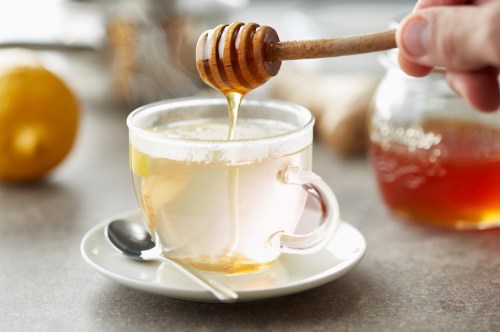Can Honey Actually Help Soothe a Sore Throat? We Asked an ENT
An ear, nose, and throat doctor shares whether or not using honey for a sore throat is a legitimate remedy or an old wive's tale.

Mary Poppins famously said that a spoonful of sugar helps the medicine go down, but what about using it as medicine itself in the form of honey?
Experts in This Article
Nature’s sweetener is often touted as a tool for soothing sore throats, but we wanted to know if it actually works… and if it’s powerful enough to be worth testing out next time we’re feeling under the weather. We asked Amanda Atkins, MD, an ear nose and throat doctor (ENT) based in Birmingham, Alabama, to share her thoughts on this popular natural remedy, and she’s all for using it as a first line of defense when that dreaded throat scratchiness first comes on.
“Honey is known to contain antioxidant and antimicrobial compounds, which can indeed help alleviate symptoms of a sore throat,” says Dr. Atkins. “It’s also full of polysaccharides, which absorb water and help create a barrier over the respiratory mucus to decrease throat irritation and the urge to cough,” making it the best home remedy for a cough.
Dr. Atkins says that ENTs use honey especially in the pediatric world to treat acute cough, as it can be better tolerated in children than when using medications such as dextromethorphan (a cough suppressant found in Robitussin and similar products) and diphenhydramine (an antihistamine found in Benadryl and similar products). She also notes that honey has also been found useful in treatment of post-tonsillectomy pain in both children and adults, which can involve some severely sore throats.
How to use honey as a sore throat remedy
While honey is a research-backed tool for helping soothe a sore throat or acute cough, it’s important to know how to dose it for the best results, especially considering its high sugar content.
Dr. Atkins says that, depending on the severity of your soreness or cough, adults can take up to three tablespoons of honey a day, but she advises only doing so for three days at a time because studies have shown no significant increase in pain relief after that point. Depending on your taste preferences, Dr. Atkins says you can consume honey straight, stir a tablespoon into tea, mix it into yogurt, or add it to another healthy food or beverage to make it more palatable.
“Honey is known to contain antioxidant and antimicrobial compounds, which can indeed help alleviate symptoms of a sore throat,” —Amanda Atkins, MD, ENT
“For kids, the most common recommended dose is one tablespoon, or spoonful, at night after dinner,” Dr. Atkins says. “You can mix the honey in milk or yogurt, if needed.”
Dr. Atkin says an important note on using honey as a remedy for a sore throat is that research shows it doesn’t matter what type of honey you have on hand (even crystallized honey will do); all types are beneficial at relieving acute pain. That means, you don’t have to splurge on the $35 jar of manuka honey or hunt one down from a local beekeeper unless you’d like to. Your favorite supermarket brand will still do the trick.
However, Dr. Atkins doesn’t recommend using honey as a sore throat remedy until two years of age, as one hasn’t yet developed an immunity to Botulism toxin that is commonly found in the sweetener, which the CDC says can cause a host of negative health consequences from constipation to progressive diaphragm paralysis.
Additionally, Dr. Atkins says that there are a few documented adverse effects of honey that may not make it the best choice for everyone to try including nervousness, hyperactivity, gastrointestinal upset, and insomnia, but it is likely safe for the average person.
If you or a family member are looking for a natural remedy to help soothe a sore throat but honey may not be the best choice for you, Dr. Atkins also recommends trying peppermints or other throat lozenges, hot herbal teas like peppermint or chamomile, or gargling with salt water. You can also try using ibuprofen and other NSAIDs.
“As always, getting plenty of sleep and staying hydrated are two of the absolute best ways to keep your immune system strong whether you’re sick or not,” says Dr. Atkins.
Sign Up for Our Daily Newsletter
Get all the latest in wellness, trends, food, fitness, beauty, and more delivered right to your inbox.
Got it, you've been added to our email list.










